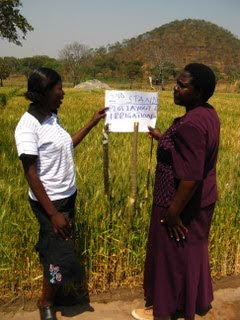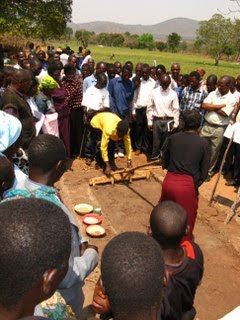It was a big day for the community and the Agriculture Dept. A lot of planning and preparation went into the field day. The farmers of Chilakonda have been working very hard on this project since May.
It is a pilot project to grow more wheat in Malawi for food security and income generation during the dry season. Our district has good conditions for wheat and a river. Water is diverted by a small dam upstream and brought to the fields by canals.

Two crop officers from Agriculture are at the station where the layout of the plots is explained. This field was cleared by hand of trees, brush and weeds. Then 1 by 3 meter basins or beds were formed with small ridges separating them. Small canals were formed between every other row of basins to bring water to them. It was a lot of work.

Here 2 of the members of the group are talking about the group plot which is behind them. This section belongs to the group - all the others belong to individual farmers. The income from this plot will be used for group expenses like putting on this field day, marketing and tools.

I love that hat!

The woman in blue is our local Member of Parliament. We also had a representative of the District Commissioner, the Traditional Authority (like a county commissioner and tribal leader), several village headmen, the District Agriculture Extension Commissioner, the District Agriculture Extension Officer and several extension agents.

This is a demonstration of how the basins were planted. I made this tool to make the grooves for planting. The dishes contain wheat and fertilizer. At planting they use 21-23-0-4S (Sulfur) then top dress later with Urea. The soil here is sand and clay with little organic matter so fertilizer is necessary to get a decent drop of anything. In fact this soil is used to make bricks for houses.

I am working on forming a group to build this pedal-powered thresher and also a pedal powered winnower to clean the wheat. The traditional way is to beat with sticks and clean by shaking in shallow baskets. Unfortunately the beating is very slow and laborious and also tends to damage the wheat. By teaching the farmers to make these simple tools with locally available materials I hope to encourage them to make other simple tools to make their work more efficient and improve productivity. Donations to Friends of Mikolongwe will help fund these projects.

The women of the village cooked a lot of food for the guests. The barrel in front contains Thobwa or sweet beer. Corn flour is cooked with water in the barrel like a porridge then sprouted millet is added to convert the starch to sugar. That's it! It's like drinking warm sweet oatmeal. If you add yeast and wait a few days you will have alcoholic beer.






0 comments:
Post a Comment